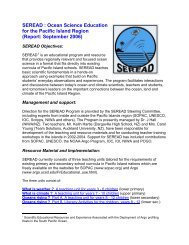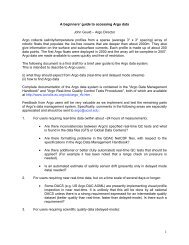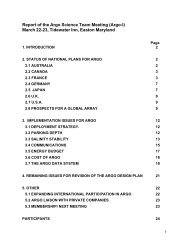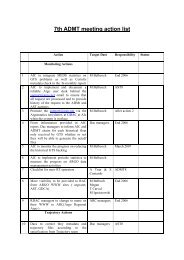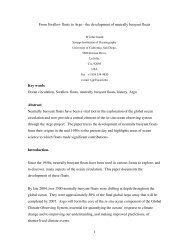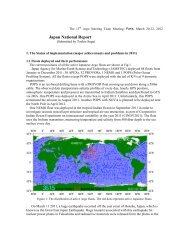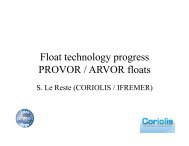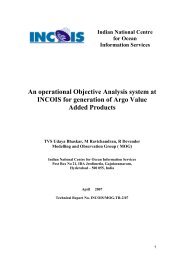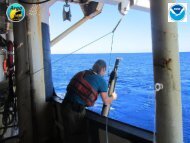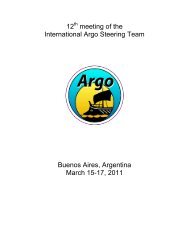11 meeting of the International Argo Steering Team Scripps ...
11 meeting of the International Argo Steering Team Scripps ...
11 meeting of the International Argo Steering Team Scripps ...
Create successful ePaper yourself
Turn your PDF publications into a flip-book with our unique Google optimized e-Paper software.
suggests that <strong>the</strong> best model for a glider program would be a federation <strong>of</strong> regionally based<br />
efforts that are coordinated through an international working group. It is proposed that <strong>the</strong> <strong>Argo</strong><br />
<strong>Steering</strong> <strong>Team</strong> encourage a small number <strong>of</strong> scientists involved with gliders to set up a working<br />
group to formulate a program to support glider deployments in boundary currents and choke<br />
points in support <strong>of</strong> climate change research.<br />
4.5 Commitments table<br />
AST members updated <strong>the</strong> commitments table and <strong>the</strong> expected number <strong>of</strong> float deployments<br />
for 2010 is large (~<strong>11</strong>00) given <strong>the</strong> small number <strong>of</strong> deployments last year. While float<br />
deployerers have many floats in inventory, it will likely take a couple <strong>of</strong> years to catch up and<br />
find deployment opportunities for all <strong>the</strong> backlogged floats. It was also noted that for <strong>the</strong> most<br />
part countries do a good job <strong>of</strong> estimating <strong>the</strong> number <strong>of</strong> floats to be deployed in that year based<br />
on new statistics compiled by M. Scanderbeg. See Appendix for more details.<br />
4.6 Sustained funding for <strong>Argo</strong><br />
A discussion was held on whe<strong>the</strong>r <strong>Argo</strong> should produce and subsequently maintain a brief<br />
document that outlines <strong>the</strong> case for sustaining <strong>Argo</strong> for a decade and longer. Several AST<br />
members noted that such a document would be helpful for seeking long-term funding from <strong>the</strong>ir<br />
national sources. A draft <strong>of</strong> <strong>the</strong> document, prepared in response to a request from GEO, was<br />
<strong>of</strong>fered by J. Willis. A small group was formed to review and improve <strong>the</strong> document.<br />
Action item 6: Howard Freeland, Silvia Garzoli, Steve Riser, Dean Roemmich, Susan<br />
Wijffels, Josh Willis will volunteer to read, review and edit a 1-page document that<br />
outlines <strong>the</strong> case for sustaining <strong>the</strong> <strong>Argo</strong> Program on a long-term basis.<br />
5 Data Management Issues<br />
5.1 Feedback from ADMT-10<br />
The data system is operating stably. The real-time data continues to provide 90% <strong>of</strong> <strong>the</strong> data<br />
on GTS within 24 hours with no major distribution issues at this time. Coriolis is providing two<br />
additional QC checks on <strong>the</strong> real-time data to improve detection:<br />
1) A daily objective analysis is performed to detect anomalies and<br />
2) A quarterly comparison <strong>of</strong> <strong>the</strong> <strong>Argo</strong> data with satellite altimetry data<br />
These allow <strong>the</strong> detection and correction <strong>of</strong> major problems much earlier than waiting for<br />
delayed-mode.<br />
The ADMT is currently focusing on improving data consistency, detecting and correcting<br />
systematic errors, delayed-mode QC, <strong>Argo</strong> Regional Centers, and improving <strong>the</strong> interoperability<br />
<strong>of</strong> <strong>the</strong> <strong>Argo</strong> data set. Activities related to correction <strong>of</strong> <strong>the</strong> pressure drift problem, delayed-mode<br />
QC, ARCs, and trajectory data are covered by separate presentations.<br />
It was noted that <strong>the</strong> <strong>Argo</strong> Reference Database was updated by Coriolis in February 2010 and<br />
that <strong>the</strong> <strong>Argo</strong> Pr<strong>of</strong>ile Reference Dataset was updated by John Gilson.<br />
Developments at <strong>the</strong> GDAC were briefed including detailed index files, MD5 signatures,<br />
automated DAC file removal, and <strong>the</strong> new layout <strong>of</strong> <strong>the</strong> latest_data files. It was also noted that<br />
<strong>the</strong> enhanced format checker has missed its deadlines but that it has been operating internally<br />
at <strong>the</strong> US GDAC for almost a month. The US GDAC (Mark Ignaszewski) will be contacting <strong>the</strong><br />
DACs regarding <strong>the</strong>ir results immediately after this <strong>meeting</strong>.<br />
<strong>11</strong>




